I’ve been waiting two whole years to say it: Sherlock Lives!
And for those of you who #believeinsherlock, “The Empty Hearse” was sure to be a treat in more ways than one. It’s already aired in the U.K., so let’s talk…
Spoilers below for the episode. Possible spoilers for future episodes in the comments.
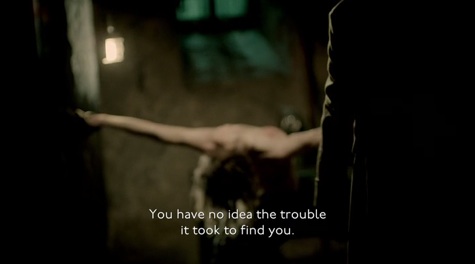
So Mycroft nabs Sherlock from the world wide field because there’s a terrorist threat that needs fixing in jolly old England. Sherlock heads back and breaks up John’s special engagement dinner by accident by way of telling him that he’s alive. John musses Sherlock’s face a few times for his trouble, but his intended—Mary—tells Sherlock that she’ll get him to come ’round. Sherlock leaves John be and tries to get on without him, first asking Molly about with him for fun and hearing John’s voice all the while in his head.
John gets rid of his mustache (it turns out that both Sherlock and Mary hate it), and is about to stop by at 221B to try and sort things with his pal when he gets kidnapped and stuffed in the middle of some choice kindling right before Bonfire Night. Mary gets a creepy text message, runs right to Sherlock with it because she’s sharp and awesome and doesn’t waste time like our boys, and they motorcycle to John’s rescue.
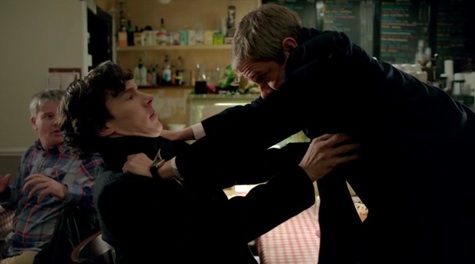
The terrorist plot unfolds when Sherlock talks to a client with a love of trains who shows him security footage of the tube featuring a missing subway car. They find out that the car is being housed in an unfinished tube station, and that it’s directly under Parliament; it’s wired with a bomb to blow up the U.K.’s leaders before they can vote on a piece of important terrorism legislation. John and Sherlock are on the train as the bomb’s timer begins, but Sherlock doesn’t know how to diffuse defuse it and begs John to forgive him before they both go up. When John finally does, Sherlock reveals that the bomb had an off-switch the whole time. He tells Anderson how he really faked his death (or does he?) everyone celebrates the gang being back together and John and Mary’s engagement at Baker Street.
Rather than Sebastian Moran, Moriarty’s right hand who appears in Doyle’s “The Empty House” tale, the Lord Moran of this episode is in on the plot to destroy Parliament. We find out at the end of the episode that all of this is likely being masterminded by Charles Augustus Magnusson (who was revealed prior as the main series three villain, played by Lars Mikkelsen, an update on the character Charles Augustus Milverton who appeared in a tale sharing his name in the canon); he shows up at the very end of the episode going over footage of John’s close shave and Sherlock’s reaction to nearly losing his beloved blogger.
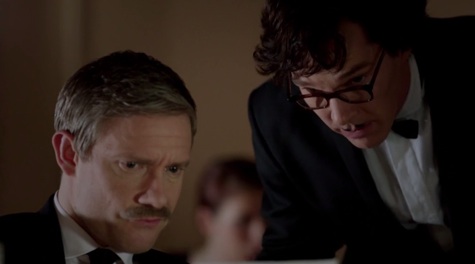
The actual pacing and movement of the episode is a bit staggery; there’s too much to get through in such a small space, and while the new director’s style is in tune with the show’s aesthetic, it needs a little time to breathe before it’s comfortable. All the same, it’s hard to care because everyone is back and better than ever, and there’s a whole lot of love in the air. From Lestrade’s bear hug to Mrs. Hudson’s scolding of John’s absence, everyone is just as happy to see each other as we are. (Also, it would seem that Mrs. Hudson is still convinced that John and Sherlock were dating, to the point where she interprets John’s engagement to a woman as him moving on from all men due to Sherlock’s death. Mrs. Hudson, you are perfect. Never change.)
It would seem that if Sherlock told Anderson the truth, he and Mycroft were playing Moriarty from the beginning. This is interesting for a number of reasons, but primarily because it makes Mycroft and Sherlock’s relationship register as much closer than it ever did. Did John’s affect on Sherlock lead to an easier working rapport between the brothers? Regardless, all the scenes between them are more darling than they have any right to be considering how chilly Mycroft is eternally—they seem more like family than ever before.
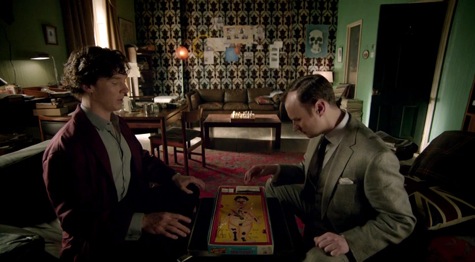
Either way, what this episode is really concerning itself with is the furthering of Sherlock Holmes’ emotional education at the hands of his friends. He hasn’t quite got it down, but he’s learning and trying harder than ever before. Despite his tactless reveal to John, you can see that he’s nervous, that he’s making such an effort to do it right and simply has no idea how he should go about it. (Always quiet and perfect, Martin Freeman’s careful treading over John’s anger and difficulty expressing his deeper feelings verbally is tragic to watch.) He tells Molly that she’s not there to be John when she helps him out, though he still makes the mistake of calling her John; so he’s aware that putting her in that position isn’t fair, but he wants to be kind and thank her properly for helping him when he needed it most.
See Sherlock Holmes. See Sherlock Holmes feel.
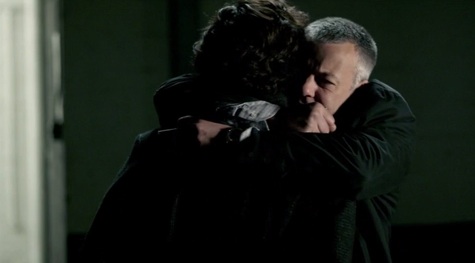
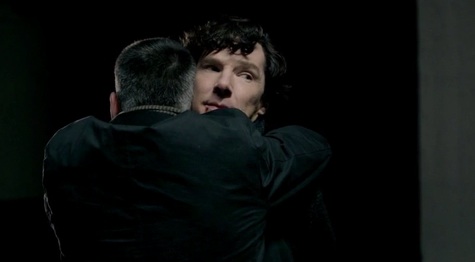
He cares so much that he flat out admits he’s happy to have friends to his ever-judgmental brother, then even goes so far as to tell Mycroft that he should try it himself. (Speaking of which, it was so nice to see “Anthea” again! Come on, Mycroft, if you keep her around, she must be less irritating than a goldfish. You should play Boggle with her.)
Parts of Holmes fandom has always expressed aggravation with the fact that Cumberbatch’s Sherlock is far less warm and kindly than his original mould, but that would seem to be the point; what we are witnessing in Sherlock over the seasons is the title character’s transformation from human calculator to a man who knows the value of his relationships and the importance of other people’s feelings. He’s still manipulative, still lacks a filter at times when he needs it most, but he enjoys his interactions with others more. He also seems to care more for his clients’ welfare—his reactions to the brief cases we see him work with Molly show him more clearly concerned with serving up justice, rather than dismissing people if he deems a case too boring or silly.
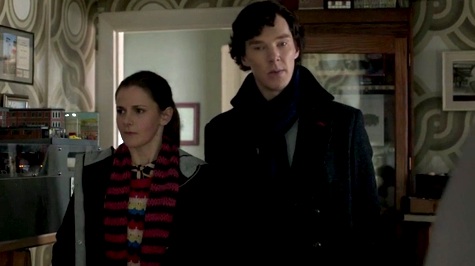
Sherlock is growing, he’s gathering people to him, he’s learning to embrace his own absurdity—as clearly evidenced by his donning the deerstalker at the end of the episode. He’s already had his image torn apart… what does it matter if it never gets entirely rebuilt to the same unfeasible stature? He has what matters, and now he knows that.
I’m sorry, I just need to stop and squeal embarrassingly for a moment, because you might not have noticed but Sherlock’s mom and dad were being played by Benedict Cumberbatch’s actual parents, and they were so adorable I just might die. This also gives us a very interesting window into Sherlock and Mycroft’s upbringing—Mr. and Mrs. Holmes must have just sat by and watched as those boys raised themselves, being so far behind their progeny. No wonder Mycroft half-raised his baby brother. And now he must suffer through Les Mis, and no one feels bad for him.
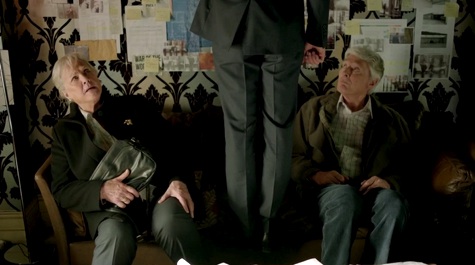
Time to take a moment and talk about the new love in John’s life, a role so ably played by Martin Freeman’s real-life partner Amanda Abbington. Here’s a list of what Sherlock gleans from Mary based on his first observations:
- Guardian
- Linguist
- Shortsighted
- Secret Tattoo (Where? Of what? I DEMAND EVIDENCE.)
- Only Child
- Disillusioned (Aw, why? Does she need to solve crimes too? I bet she does.)
- Lib Dem
- Bakes Own Bread
- Appendix Scar
- Cat Lover
- Part Time Nurse
- Liar (About what? Liking John’s mustache? Talking to John on Sherlock’s behalf? We know she does, so then he’d be wrong about her… so maybe she lies about other things?)
- Size 12 (Guess he feels like that’s super important to notice since the Irene Adler Measurement Debacle. Sigh.)
- Clever
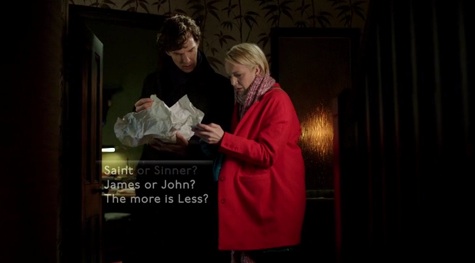
And we know how hard it is for Sherlock to admit other people are clever, but then it is also canon; Holmes was immediately complimentary of Mary Morstan’s intellect in Doyle’s writing, just upset about Watson running off so fast to marry her. It was nice to see the character well-respected, rather than being portrayed as some sort of wet blanket who is preventing the crime-solving superteam from getting back together. She is a perfect balance between them, actually—she instantly goes off on Sherlock for leaving John in the dark for two years, but is more than willing to turn around and laugh at John when he won’t let go of his anger. Hopefully we’ll see lots more of her in the future. (Likely, as the wedding is next.)
There are so many little nods to the fandom and fan culture in general that speak a lot like a love letter to everyone who’s been carrying the torch for these past two years; the ridiculous theories perpetuated by Anderson and his cohorts are inspired by many of the more insane fan explanations following “The Reichenbach Fall” (particularly the bit about the Mission Impossible style masks, which was very popular for a while there). There’s a nod to the Sherlock/Molly fans with that heroic kiss when Sherlock crashes through the window in Anderson’s version, then another to Sherlock/Moriarty fans with their near snog suggested by another Empty Hearse Club member. Anderson’s rage with the offending slash fan was perfectly on point—in his madness, Philip Anderson has become that fan, the fan that makes fandom no fun for anyone by insisting that his version of everything is the only correct one, and dismissing anyone who disagrees.
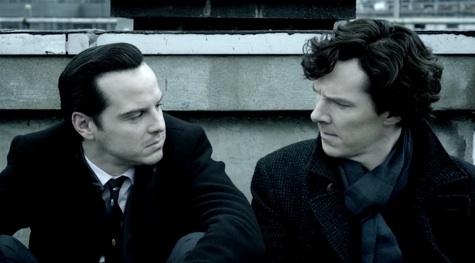
Oh, Anderson. We should hardly be surprised.
Some questions for the future:
- Okay, Anderson went off the deep end, but where the hell is Sally Donovan? Obviously she didn’t have a breakdown like his, but is she still on the force? How did she feel about Sherlock’s eventually proved innocence? Considering that her ire toward him has always been the most bitter, it would be nice to see where she stands.
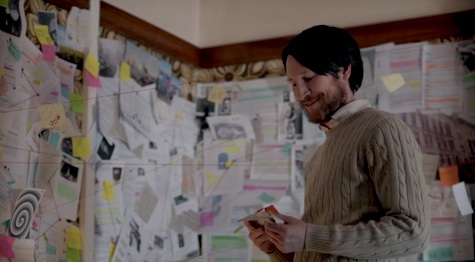
- Is the new man in Molly’s life really okay this time around? He does seem like a Sherlock stand-in, so we can only hope Molly’s truly happy and not filling a gap. And that he is not secretly evil.
- What is Magnusson up to at this point in the game? We know from the canon tale that he’s a blackmail artist of a premium variety; was threatening John just an example to the detective, proving that he knows his weak spots? Was it a test to make sure John was still it?
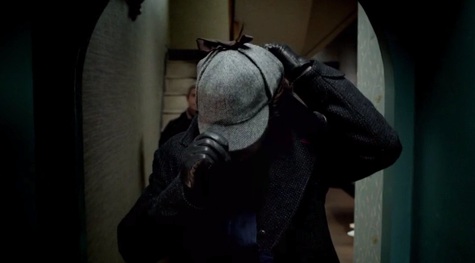
And how did you enjoy it? Are you excited for the next episode?
Emmet Asher-Perrin was so happy every time John body-tackled Sherlock for being an ass. You can bug her on Twitter and read more of her work here and elsewhere.










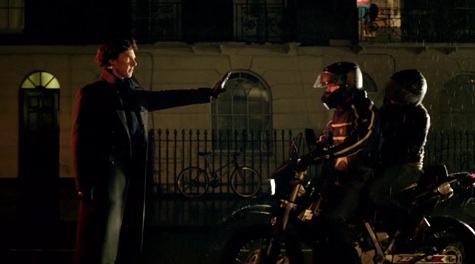
The Guy Fawkes style storyline itself felt rather thin, but it was really secondary to the character exploration and growth, with everyone reacting to Sherlock’s return and moving forward from there. There was also quite a lot of having fun for the cast, and poking good natured fun at the fandom, which so far everyone’s seemed to enjoy.
I don’t mind that we never get the “real” version of How He Did It. At this point, nothing will live up to expectations, and a little mystery is a lot more fun. There’s probably a bit of truth in the story Sherlock told Anderson, but if they never reveal it, I think that’s fine.
I adored the scenes between Mycroft and Sherlock. It really fleshed out Mycroft more, and exploring their relationship worked. I wish there’d have been a little more with the parents–I got up to refill a drink, and my kitchen’s just separated from the TV by a bar, so it felt very blink-and-miss-it, but I can see why they didn’t linger too long on those cameos, either.
John did not surprise me in his violent reaction to Sherlock. While he struggled to keep control, John DOES have a nasty side, and Sherlock probably expected to get hit. Maybe not more than once, though.
Mrs. Hudson ships John/Sherlock, stubbornly.
Of course I recognised Wanda Ventham, but I didn’t know Cumberbatch was her son.
Martin Freemen’s initial reaction/anger at Sherlock at the reveal was so, soooo good. I specifically thought at the time about how excellent it was. The repression and loss of words! Fantastic. I totally called John punching Sherlock for his trouble, even though I know we all wanted the “bear hug” to happen. I’m glad someone did it!
My fav part was probably the fan-solution where Sherlock and Moriarty prank John and giggle about it. The kiss was hilarious too, but the lead up was the best. (How did the two act that scene without dying of laughter? Bloopers, please!)
I prefer character development and interaction, so this was a great episode. It definitely shows growth in the characters and so many shows/movies fail to do that in any meaningful, appropriate way.
Great treatment for all the ladies, too. Ms. Hudson was adorable and sassy as usual. Mary was smart and delightful (much like the RDJ Sherlock Holmes movie Mary). I was afraid Molly was going to get second-bested and treated poorly, but they tied that up neatly and made sure Sherlock said some good things. I can’t wait for the next one!
I feel that maybe the Season 2 cliffhanger was so big that they needed to spend a whole episode talking about it, so this episode seems the least focused of them all, with the 2 year gap, Sherlock returning, Watson having to deal with that, getting the two back together, all the theories about how Sherlock faked his death. It didn’t leave a lot of time for the mystery, which really fell out of focus for large sections of the story and was resolved fairly easily.
But I love these characters so much and it’s so much fun having them back and interacting that I don’t even mind.
It is not ‘Disillusioned and Lib Dem’. It is ‘Disillusioned Lib Dem’. Ask a Brit.
The true version of Sherlock’s death is obviously the one with Derren Brown. I mean, we know for a fact that it wasn’t him for the trick with the police box, so what was he really up to at this moment? There’s something fishy here, it’s either a cover up for the British government or for UNIT.
The only thing that stood out for me is that they couldn’t find someone who could actually speak Serbian. And Mycroft mastering the language in a couple of hours strains credulity a little. I guess he’s just so badass.
I just loved the fact that Sherlock and Mycroft were playing Operation. They had you all set up for a chess game and then the buzzer..
[SPOILER !]
Do you guys have any idea about the mysterious man we saw at the end of that episode ? I’m thinking about Sebastian Moran, personally.
My husband and I just watched this and loved it. I loved how they fooled us at the beginning with the fake solution. I loved every bit of John, with Mrs Hudson, with Mary, with his patients, and with Sherlock. I loved Mycroft and Sherlock, Molly and Sherlock. He’s learning to deal with emotions and to love emotional ties, and he’s trying to teach his brother. Awwww.
I don’t think any of the explantions we were given was the whole truth. OK, nothing of the first two were, but I have the feeling the last was not either. I don’t mind. I just like that he’s back, and he’s finding his family is a lot bigger than he thought.
One additional note: I really dreaded how they’d handle Mary. I loved her too. They made her smart, and made her understand Sherlock, and she surprised him. Twice! I hope she’s a part of the upcoming shows because she seems pretty great.
I am really not getting it. Where you see fan service, I see nothing but contempt. There are no actual mysteries of any kind. It’s always just Sherlock making assertions – even explicitly spelling out that really they are only guesses, yet still treated as received fact – and lots of “oh but what we didn’t tell you was XYZ wink wink”. The Real Version of how he survived the fall? It’s “We don’t know and we don’t really care.” And seriously, an off switch? That’s on a par with last season’s “Of course there’s no such kind of computer code, don’t be ridiculous – that’s impossible.”
The character himself – well, you can say there’s growth of some kind
I suppose. But slime mold grows too. This Sherlock is a repellent selfish dick. I was so hoping for Watson to clock him in the head with that champagne bottle.
Part of the difference between fan service and contempt is intent.
And it is abundantly clear that Moffat, Gatiss, and everyone else involved in creating this show are not merely fans in their private lives. They are part of fandom, and they both love their community and know its foibles.
What is this show, except two avid fanfic writers with the power and connections (and amazing skill) to make their fanfic canon? And with the generosity to leave spaces for others to imagine and create their own fanfic, their own theories as to what happened. In this case, the story that the creators wanted to tell did not demand an answer to those questions, so they deliberately and canonically left room for others to speculate and create fanfic, to the point of making the existence of such speculation canonical.
Someone with contempt for fandom would not understand the impulse to create stories in the gaps enough to work it into the human nature of their characters. And while believing in the characters, and creating stories in the gaps of canon doesn’t make it real, it is an act of love to dream such stories.
Lestrade believes in Sherlock, and respects the stories. He’s only concerned when people, without sufficient evidence, seem to blur the line between what they wish could be true and what they believe to be true.
My take on it was that Lestrade had imagined his own thousand stories of how Sherlock might have survived, and struggled to keep sight of reality, to not let his imagination drive him to believing without evidence.
And he was right. Even though the people speculating on Sherlock’s survival were correct in that he survived, none of their theories had the evidence behind them to be actual in-story explanations of how he survived.
So what we see, from the creators of the story, is respect for the way fans imagine possibilities of survival by allowing those imaginings to stand, and the outcome to be true, and the details to be left for the fans themselves.
I adored it. Loved the depth of the episode, but it was written by Mark Gatiss, so Moffatt didn’t get involved. It has Gatiss all over it, if you know his work.
I love that Sherlock is a dick. Of course he is. The original was. He shouldn’t be anything else.
On the other hand, I’ve really gone off Dr. Who, and I’m trusting Capaldi to bring it home.
@13 Actually, this Sherlock is MUCH more of a dick than the original Holmes EVER was. The original could be kind, caring, compassionate, and very considerate. Even morally outraged and concerned over the well-being of others. This one is rarely ever any of those things.
Ursula (@12), you are spot on. Thank you for being so eloquent!
The whole ep was a love letter to fandom. By fanboys. Who love us and love their show and it’s all a shared game.
Because if Steven and Mark are not THE biggest fanboys of ACD in the universe, then I’m missing something.
I don’t think I am. 8)
Happy SH Lives Month!
Anne*—
I don’t think so. The original Sherlock Holmes cared for nothing except the solution and keeping his mind occupied. He turned distressed people away if their problem wasn’t interesting enough. He took cocaine a lot. Only one person ever made him angry (Milverton) – and his modern version is coming up. One woman interested him, probably because she bested him. All others were solutions. He treated them with the courtesy demanded of his age, but that didn’t imply caring.
Watson got morally outraged, tried to persuade Holmes that he should be, but Holmes didn’t care. All the passion and emotion in the original stories comes from Watson. Holmes (as opposed to Sherlock) lived in an age where gentlemanly behavior was drilled into a respectably-born boy from birth. It doesn’t indicate any real emotion. The original Holmes is probably more of an egotist than Sherlock, designing elaborate disguises and deception to get people to say “Wow, you’re brilliant!” That proves his downfall in the Bohemian affair.
I have agree with #11 tatere about the contempt. The person giving the slash explanation was a young woman with a nose ring. I thought this characterization of the fandom, as well as Anderson’s mania, distasteful. If we had seen the believers/fans helping on a case in some way, it would have felt less nasty.
I enjoyed the epidsode overall, but the end would have been much improved if John had defused the bomb after getting an apology from Sherlock. (I did crack myself up by pointing out that this was a confrontation between Smag & Bilbo!) The writing and acting was excellent as Sherlock is portrayed as more alien & damaged than ever while also being a complete asshole. But lovable. How do they do that?
Can someone explain the last scene? They gather the Scooby Gang at 221B for drinks & then John & Sherlock leave? Or was that supposed to be a doorstep press conference?
Extra spoliage: As for Molly’s new beau, it has been suggested on tumblr that one should take a close look at Moriarty’s sniper in the final sequence from last season.
I’m sorry, I can’t see contempt there. I appreciated both the treatment of fans and fan theories and the nods to the original Canon (when Mary got the text reading “John or James Watson?” I broke up laughing, though not as hard as I did at the British Birds sequence).
And yes, Sherlock’s a dick. Someone as brilliant as he, raised the way he was (in great part by that mega-dick Mycroft), would have difficulty dealing with other people whether or not he is actually on the autism spectrum. Having learned to appreciate John, though — and do note that he literally went through fire to save him — he is also learning to appreciate other “ordinary” people, who may have their own extraordinary qualities.
They’re following the original Canon here, with Sherlock’s deception of John and even his reason (basically that he didn’t trust him not to spill it). That’s a massively dickish thing to do, and in the original story Watson just takes it. But this John calls Sherlock on his dickishness, and he clearly regrets having hurt him.
It’s interesting to compare this with the portrayal of Sherlock in Elementary, though obviously that’s a very different show. Their Sherlock is such an asshole that he alienates the police, even though Joan Watson runs down a list for him of things he should not do. I do agree that the original Holmes’s learned gentlemanly behavior covered a lot of sins.
I actually went and did the looking-at-the-sniper thing. Had TEH and TRF playing side-by-side on the important bits. Seriously, everyone, take a VERY FREAKING CLOSE LOOK.
Also. Everyone, go and take a very close look at the wall behind Anderson. Anyone else spot a TARDIS?
For my part, none of the three solutions are the right one. Jack Harkness was the one who jumped off the roof while Ten used the TARDIS to get Sherlock down to the ground in time for him to lie down and get all bloodied-up for John. That’s my theory and I’m sticking to it.
I will say that I have read none of the original books and I’m sure that being familiar with them would make a difference in how this would strike you.
I think the recent episode of “Elementary” following on the heels of this makes for an instructive contrast. One wants to seem smart, one is.
Jaggedrain (@19): You’re dreaming. It was Eleven.
;)
I’m on the fence about tatere’s “contempt” point. RiverVox’s addition highlights it. I did love the Moriarty kiss and especially the lead-up, but at the same it, it was yet another tired example of Moffat making a punchline out of homosexuality, rather than treating it as equally boring as heterosexuality. (See: Every other Who episode.)
I disagree with this:
** And seriously, an off switch? That’s on a par with last season’s “Of course there’s no such kind of computer code, don’t be ridiculous – that’s impossible.” **
… because I thought that “There is no code, doofus!” was a great moment. That’s not just because I’m a computer guy and enjoyed the unexpected semi-parody of fictional hacking, but because it was an example of the villain one-upping Sherlock with a red herring. And in any case, a deus ex machina that benefits the bad guys instead of the heroes is generally acceptable to me, whereas the switch on the train bomb was kind of dumb.
Also, I lost all patience when Sherlock did what he did there, becuase he’d already had a big scene of theatrically manipulating John’s emotions. That’s why I agree with RiverVox: “the end would have been much improved if John had defused the bomb after getting an apology from Sherlock.” I orignally came here just to post the same thing. Specifically, if I could change the episode, I would have had it like this…
So John is actually unaware that it was Sherlock who had saved him from the fire, instead being told it was some emergency worker person and that Sherlock got there after the fact. (Why Mary would stay silent is unclear, but maybe she would honor Sherlock’s refusal of the credit.)
Later, they’re with the bomb. Sherlock suggests that John, with his army experience, take a look. John reluctantly does so, and a few moments later says “Oh no. Oh God.” Apparently, he knows that this particular type of bomb, set the way it is, can’t be stopped. It’s hopeless.
They have a conversation about John’s speech at the grave. Sherlock tells John how he wanted to show up then, but he just couldn’t, and sincerely apologizes for both his extended absence and his “surprise”. John says he truly is glad Sherlock’s alive and came back, or he would be, but now it just means they’ll both die from a bomb. Sherlock muses that it might have been worse to die in a fire, then clarifies that it was he who had saved John, not a professional.
John is surprised and looks a little chagrined, then says bleakly and dryly that it makes them even. Sherlock half-understands, saying something to the effect that saving John’s life probably does make up for what he (Sherlock) did, at which point John says he’s not talking about that, he more or less forgives Sherlock for that. What he meant is that he’s just repaid Sherlock for saving his life, although he’ll also consider them even when it comes to pranks. He waits a second for Sherlock to get it, and Sherlock starts grinning, then laughing. As John explains that there was a simple switch all along, they both fall into laughter. The police arrive, Sherlock gets to show how he was messing with John’s head and had called them, etc.
@@@@@ enviator (22): It was 12!
As this is a fictional story I can accept the invention of a disused tube station (named for a street which doesn’t exist). However I have a number of problems with the mechanics of the hijacked railway car.
1. The station must be on a loop from ‘live’ lines – otherwise how do you drop the last car off and let the rest of the train continue? Or leave the car parked for several days without blocking the line? This requires operation of points of each end – driver could not do this alone.
3. Car would need to be replaced by morning – a train running a car short on the Underground would stick out a mile. – This would also require the complicity of many more people than just the driver.
4. If the station has never been used, why are the rails live?
5. Lastly if you’ve got access to tunnels under Partiament, why both to rig up a train car? Why not just unload the explosives onto the platform?
@Jaggedrain (19+23) @enviator (21) http://shirt.woot.com/offers/how-he-survived
:)
It seems that not everyone may have gotten the same twist out of the ending that I did, so allow me to shed a little light on an interpretation which might suit the good Gatiss style better.
If you go back and watch the bomb disarm scene, you will notice that Sherlock changes demeanour slightly right after the bomb reaches 1:29, and he sits up. From then on, he is no longer talking about the bomb, but rather about him not being able to apologise properly to Watson. Every one of Sherlock’s sentences from then on fits that interpretation, and he doesn’t immediately consider that Watson may not pick up on it. Which he obviously doesn’t.
After the cutback to the third explanation, we return to a Sherlock who’s just realised that Watson hasn’t realised the misunderstanding, and is in tears laughing about it. He takes the opportunity to pretend he was merely yanking Watson’s leg, rather than admitting to his ‘moment of inperfection’, in a way grasping the unexpected chance to roll back his admission that he was sorry and that there was something he did not know how to do (apologise). This may not be Sherlock’s most shining moment, but he is only just beginning to experience and deal with his friendship emotions, and he is overcome by his own pride.
This crosstalk technique, playing to the expectations of the audience, and requiring a bit of digging to spot, is evident again a bit later, where Watson mentions his gravesite speech, then doesn’t realise that Sherlock is talking literally when he answers that he was there, and that he listened, rather than metaphorically. We as audience, know Sherlock was there, so that is of course the first interpretation we jump to as well, but the second one is there as well, evident in Watson’s reaction.
Well we just got this episode last night at my house so I guess I am late to the party. Great to have Sherlock back! I am trying very hard not to read ahead for spoilers right now.
I wish the episode had a little more mystery in it and a little less catching up/discussing how Sherlock survived. but I can live with it. I liked the Mycroft bits, glad they decided to add a little more to that character. The real standout was the Mary character, well done IMHO.
I did not know that those were cumberbatch’s real parents… very cool. that must have been a fun day on the set.
Would you please repost this for those of us in the US who have just started seeing these episodes. “The Empty Hearse” was on last night, and the next two shows will be on the next two Sundays.
Yes, I agree with others. Put some sort of link to these reviews near the top for all of us who waited to comment until we had seen the show on PBS here in the USA.
I very much enjoyed the show, and while I was initially frustrated not to get a definitive answer about how Sherlock survived his fall, in the end, I decided that was a great way to go.
I loved John’s anger when Sherlock first revealed himself, and Sherlock’s bafflement at the reaction–that worked so well for the characters, and the acting was brilliant. I also love Mary in the mix, and her not being an impediment to the bond beteween the two of them–that would have been so trite.
Looking forward to next week!
Loved the story. Hated, absolutely hated the direction. If it were not Sherlock I would have turned it off in disgust. I felt like I was watching a student film that was trying too hard to be “up-to-the-minute’. Just give me a great story with these great characters and forget all the film school pyrotechnics, please.
Great soundtrack!!!!! Especially the first track, and the track at the restaurant.
Bombs are normally defused, not diffused.
John tackled Sherlock not once, not twice, but three times! I cheered the third, because oh, did Sherlock have it coming.
Like @26 Umbraclaw, I picked up the crosstalk in the train carriage; Sherlock honestly did apologize, and then disguised his embarrassment and confusion by pretending he had been talking about something else.
The only thing that sat askew for me was the speed with which John got over his grief and rage. Sure, taking it out on its source three times was probably cathartic…but all the same, that was over damned fast. Maybe to maintain the madcap tone of the episode? I hope we see lingering effects, because there sure ought to be.
One small note.
The Character of Charles Augustus Magnussen is played ny Lars Mikkelsen, brother of Mads Mikkelsen who plays Dr. Hannibel Lecter on Hannibal.
Freaky criminals apparantly run in that family.
I think John was too easy on Sherlock. The head-butt was more like what I think he deserved.
The filming seemed overly “trippy.” Too busy. I’m with #30 Bob here.
When did Mycroft become an active participant? He usually is shown as a reclusive character who does not go out. And HE saved Sherlock at the beginning? Really? It seems much more in charater for them to have their tet a tet later (playing Operation, for heaven’s sake) at Mycroft’s place.
Good questions #24 Couchboy
#22 Lenoxus Nice alternative ending Don’t see the need for hiding Sherlock’s saving John from the fire.
I must say I was sincerely disappointed by “The Empty Hearse”. Gatiss’ episodes have never been my favorites of the series, but this simply wasn’t even close to the quality of writing and storytelling I’ve come to expect from “Sherlock”.
Briefly, the multiple plots in this episode were not really solved by Sherlock but instead relied on luck/coincidence (and not more than a bit of plain stupidity).
Concerning the TERRORIST PLOT, Sherlock is essentially handed the vital clue by the mystery villain: Guy Fawkes. And even then Sherlock doesn’t make the connection. Moreover, a terrorist attack is due in close proximity to Guy Fawkes Day and that connection isn’t even on Sherlock’s (or Mycroft’s) radar?? The moment Sherlock’s “rat” disappeared under Westminster, Sherlock should have solved the case. Guy Fawkes and a mystery below Parliament would simply have been too much of a coincidence to ignore.
Oh, and about that “rat”. Sherlock tells Mycroft that all his rats are acting normally. Yet the one rat had disappeared (apparently not to resurface till much later). And yet Sherlock finds this out, not from his homeless network, but by the sheer coincidence of a rail fan coming to him about it?
Really?!!?
Oh, and when shown the rail video of the man who disappears, Sherlock doesn’t recognize the “rat” immediately? John recognized him right away in some grainy pictures from across the room – and did so without having been ‘focused’ on him for two days!
Sherlock was always a step behind on this plot. It wasn’t his actions or his deductions which truly solved it. He almost literally had to be hit over the head before he made the obvious connections.
Concerning the REUNION PLOT (getting John to come back), Sherlock doesn’t ‘solve’ this problem either – though he definitely got the ball rolling with what I call his THREE PUNCHLINE PLAN.
The sequence in which Sherlock is punched by John three times is not Sherlock being an idiot when it comes to human nature (as John always claims). Sherlock’s ‘wink and nod’ response when Mary makes that very claim indicates Sherlock (as has been demonstrated over and over again) truly does know human nature. His response indicates that Sherlock has purposefully provoked John all night. Why? Because Sherlock knew John would naturally be angry – angry at three things (which is why there were three PUNCH LINES to the sequence). John would be angry that Sherlock had lied to him. John would be angry that Sherlock had told the truth to others. And John would be angry that Sherlock simply expects John to come back now.
But Sherlock also knew that John *would* ultimately come back because he knows John does miss “this” – ie misses The Game. And Sherlock wanted John to come back now rather than later. So Sherlock purposefully provoked John’s anger (which is why Sherlock’s initial joke about the mustache comes across as awkwardly as his frantic, fraudulent fear in the train car at the end. It was all acting on Sherlock’s part). In other words, instead of Sherlock letting John do a slow boil – thus taking an untold amount of time for John to satisfy and get over his anger and outrage – Sherlock brought John to boil immediately on all the things he would ultimately get angry about.
And we see that Sherlock’s tactic works. It only takes a day of his mind spinning (like Mrs. Hudson’s cleaning brush) for him to get over it. Then it’s off with the mustache. (We don’t even get to see why he gets over it. We just see the conclusion that he did.) And then it takes less than a day more of boring work for John to relent and admit he does miss The Game. So in less than 48 hrs he returns to 221b on his own.
So this REUNION PLOT is much more of a fizzle than any real drama. Everything is a foregone conclusion that is resolved almost immediately. There is no real question, choice, or conflict for anyone. And, though Sherlock hurried it, John is the one who ‘solved’ it (mostly off-screen). Sherlock did not.
Concerning the KIDNAPPING PLOT, John was saved by chance event, not purposeful action. If not for the fact that the fire needed an accelerant, John would have died. Sherlock wouldn’t have saved John at all.
John was saved by luck.
Concerning THE FALL PLOT, the story sets out to say it doesn’t matter how Sherlock solved it. And it makes fun of anyone in the audience who might complain that it *is* important – that a story is only as good as the logic and drama of its events. (Note that the person who represents the audience in this story – Anderson – is the person who is totally ridiculed throughout the episode. Treating your audience as an object of ridicule is NOT good writing.) So Sherlock doesn’t resolve THE FALL PLOT satisfactorily (as many online have pointed out, there are enormous holes in the final explanation. But, again, the writers have Sherlock himself ridicule you if you dare not just accept it. Anyone who isn’t satisfied is just a crazy ‘Anderson’.) You are simply supposed to be grateful that Sherlock lives – and stop worrying about HOW.
Put simply, Gatiss’ story does a “bait & switch”, saying THE FALL PLOT isn’t important. The *how* isn’t important. The story says (by means of John’s explicit statement), that the REUNION PLOT is the only thing which is important. Why Sherlock lied to John is what’s important.
But even *there* we don’t get satisfaction. Why did Sherlock lie to John? Because John might *blab*?!?!?!?
Please!!!!!
The fact that Sherlock told so many other people – including his parents(!) – makes his reason seem complete “facile”. John provided a better – a truthful and important – reason to Mrs. Hudson for why he did not contacting her the entire two years. And Sherlock could have been allowed some answer which mirrored John’s, thus letting John see they are the same and thus forgiving him (and thus giving the audience reason to accept John’s forgiveness. It would be EARNED.) That would have been good writing. Instead Sherlock is given – and gives – NO real good reason. And thus John forgives for no real good reason (especially after Sherlock again betrays him in the train car and laughs at having thus lied to him once more).
Far from earning the forgiveness, it feels wrong that John didn’t punch Sherlock *again*. In other words, the supposed success of the REUNION plot seems out of character and totally UNEARNED. It is a complete contradiction.
It’s like a criminal being given a pardon BECAUSE he committed his crime again. It’s just plain stupid!
By having John simply accept Sherlock’s original betrayal and his newest betrayal, the writers engage in a third betrayal: they betray the audience.
So both THE FALL PLOT and THE REUNION PLOT – ie the two major plots of the story – are ended extremely unsatisfactorily (which is an understatement).
Overall, Sherlock himself didn’t really achieve anything in this story. He didn’t earn anything by means of his actions. It was all coincidence, chance, and the actions of others (even Sherlock’s return to London was Mycroft’s act, not his own!).
That is simply BAD WRITING.
And that is why I consider “The Empty Hearse” not only to be the very worst of the “Sherlock” stories but – because it is the climax of “The Reichenbach Fall” – it actually diminishes one of the best of the “Sherlock” stories.
I expect far better from “Sherlock”
I think that if you were expecting a linear narrative, then you’d undoubtedly have been disappointed.
This episode broke the fourth wall so much that it ceased to exist. The nods to the fandom, the teasing with the alternative explanations were all pointing directly out of the box to the viewer.
The bomb plot was intended to be what it was, and there were several references to movies, particularly “Skyfall,” which was filmed at the same location.
References were both horizontal and vertical. This was much more a piece of European-style film-making than American straight-line narrative. Gatiss has always shown this tendency in his work, evident in “The League of Gentlemen” and “Psychoville,” and in his work with long-time writing partner Jeremy Dyson. His colleague Steve Pemberton shows similar leanings in the episodes he wrote for “Whitechapel.”
I’m loving this new awareness and a willingness to do more than tell a story, as well as the desire to explore characters and situations in a different way.
The point about the different escapes is exactly what Watson says – it doesn’t matter. It could be done, so what did the specifics matter? I don’t think the truth emerged in the episode, but I don’t think it matters. As the story develops over the three episode arc, some things become clearer, and the final episode is nothing short of brilliant. I don’t think Anderson represents the audience, only a certain section of the audience for most programs that take the action too seriously and try to translate it to real life.
It’s fiction. Actually, it’s fiction made out of fiction, plus the careful addition of characters like Mrs. Hudson, the most relentless shipper of them all.